




 |
   |
 |
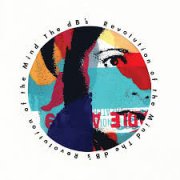 |
Revolution of the Mind (2013, 14.21) ***½/T½Revolution of the MindLakefront Orange Squeezer pH Factor (live) |
Current availability:
Chamberlin used:
To my shame, I've never heard legendary powerpopsters The DB's, the band that gifted Peter Holsapple (R.E.M.) and Chris Stamey (Sneakers) to the world. After splitting in the late '80s, an early 2000s reformation finally bore fruit in 2012's Falling Off the Sky and the following year's Revolution of the Mind EP, one of those infuriating 'Record Store Day' vinyl-only releases. Having not heard their early work, I can't do an A/B comparison, but what I'm hearing is powerpop with an early rock'n'roll influence, particularly noticeable on the live version of pH Factor. Top tracks? The blistering title track and Orange Squeezer.
Holsapple plays real-sounding Chamberlin, most likely co-producer Mitch Easter's M1, although the EP wasn't recorded at his studio, with a strings part running right through the disc's ballad, Lakefront, in pleasing fashion. Welcome back, the grammatically-incorrect DB's.
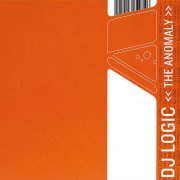 |
The Anomaly (2001, 60.57) ***/T |
|
| French Quarter Black Buddah Ron's House Michelle Frequency One Tih Gnob Bean-E-Man Who am I? |
Soul Kissing Afronautical The Project(s) Hip-Hopera An Interlude Miles Away Drone |
|
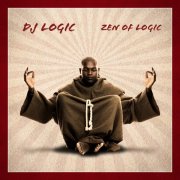 |
Zen of Logic (2006, 56.29) ***/T |
|
| Peace Y'all (I am in the House) 9th Ward Blues Balifon Planet Hypnotic Interlude #1 Simmer Slow Afro Beat One Time |
Something Distant Hope Road Smackness Interlude #2 Rat Pack Holding Down |
|
Current availability:
Mellotrons used:
Jason "DJ Logic" Kibler is part of the New York scene that includes Medeski Martin & Wood and Scotty Hard and was mentored by Living Colour's guitarist extraordinaire Vernon Reid, giving him immediate kudos 'round these parts. 2001's The Anomaly was his second album as Logic, a hip-hop/jazz crossover, effectively, with elements of other styles thrown into the cauldron; not typical Planet Mellotron fare, I'll grant you, but good at what it does. Highlights? Opener French Quarter's jazz moves and Ron's House, perhaps. Medeski plays uncredited Mellotron on Frequency One, with mad, atonal strings and choppy choirs.
After several collaborative efforts, including guesting with Groundtruther, Kibler followed up with Zen of Logic, featuring his turntablist skills extensively, alongside musicians of the calibre of Medeski and Hard. Medeski plays credited Mellotron on Rat Pack, with choir chords and a flute melody that do the usual thing for the song. Shame it's not on anything else, but there you go. Kibler/Logic's clearly way beyond the usual mainstream hip-hop idiocies; if only the brand leaders would take a leaf from his book. They won't, of course, as their sales would plummet, which says more about the general public's intelligence than I ever could.
See: Medeski Martin & Wood | Scotty Hard
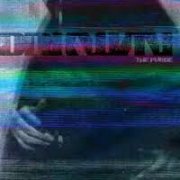 |
The Purge (2015, 55.36) ***½/T½DarkwaveSoundtrack Count Chockulous Datura Scars Hell Bass Gazzelloni Shmeeans Kuti |
Current availability:
Mellotron used:
DRWWAV are the Brooklyn-based trio of Eric "Skerik" Walton (sax), John Medeski (keys) and drummer Adam Deitch, their first album, 2015's The Purge, being produced by Master Musician of Bukkake and Sunn O))) collaborator Randall Dunn. The end result is a kind of jazz/electronica/noise hybrid, possibly at its best on Soundtrack (John Carpenter on steroids, with drums), Count Chockulous' sax-driven skronk and Scars' Hammond frenzy.
Medeski plays his M400, with buried, low-end strings on Soundtrack, mad, upfront ones on Hell Bass, complete with his patented 'mess with the flywheel' radical pitchbending technique and more of the same, albeit further in the background, on closer Shmeeans Kuti. According to their Facebook page, they started recording a follow-up in 2021, so watch this space.
See: John Medeski
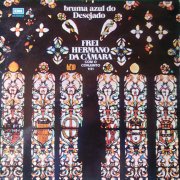 |
Bruma Azul do Desejado (1973, 32.15) **/½ |
|
| Vem Senhor Jesus Graças ao Senhor O Sonho Hino da Esperança Bruma Azul do Desejado Estrela do Mar Saudai o Senhor Hino de Natal |
Paz na Terra Natal em Belém |
|
Current availability:
Mellotron used:
Frei Hermano da Câmara is, of all misbegotten things, a Portuguese singing monk, although it seems he began his musical career before taking his vows. 1973's Bruma Azul do Desejado was his second album, backed by José Cid's Quarteto 1111, but don't think, even for a moment, that any of that outfit's progressive intent finds its way in here; this is an album of slushy Mediterranean balladry, sung in Hermano's high tenor, not unlike Demis Roussos' contemporaneous work on the other side of the continent.
Cid plays one of his own Mellotrons, but only just, with near-inaudible strings on closer Natal Em Belém. I'm not saying it isn't elsewhere, but if it is, it's at the subliminal level. I suppose I should be kinder to this, but I really can't be arsed.
See: Quarteto 1111 | José Cid
Daal (Italy) see: |
 |
 |
Before the Beginning (2002, 63.12) **/T |
|
| Shadow of the Saints Change Me Back Help Me Wearing Maybelline Three Wise Men Stronger Now Wish I Could Go Back in Time Tell Me (We All Won't Make it) |
Eight Seconds Make Your Move Candy Cane You Promised Don't Take Away My Song Tremble |
|
Current availability:
Chamberlins used:
Born in New York and named for the Steely Dan song (or, I suppose, album), Aja Daashuur moved to California and made just the one album, 2001's overlong Before the Beginning. And it's... a completely generic pop/rock album of the time, utilising (to quote from Allmusic) '...everything from alt-rock crunch to techno beats to orchestral strings'. She has a lovely voice, but the music and lyrics are terrible, as you might expect.
Rami Jaffee plays full-on Chamberlin strings on the chorus of Tell Me (We All Won't Make It), while Zac Rae adds them to Eight Seconds, both to passable effect. These days, Aja works as a kind of new age medium; at least that means we shouldn't be subjected to any more of her music. Not awful, but pretty bad.
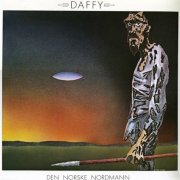 |
Den Norske Nordmann (1981, 36.42) **½/TDen Norske NordmannHjertets Rytme Alt Går Galt Natt-Mareritt Du Vet, Jeg Vet Masken Falt UFO Om Sladder Svart Natt |
Current availability:
Mellotron used:
Daffy? A one-off Norwegian/British outfit, by the looks of it, led by the gravel-voiced Rolf Kjernet. 1981's Den Norske Nordmann (the Norwegian Norwegian, depending on translation) is definitely an album of two halves, kicking off with several yeah-whatever pop/rock tunes before finding their mojo in a mid-album cluster with the propulsive Natt-Mareritt, blues instrumental Du Vet, Jeg Vet, the slow-burn Masken Falt and the closest the album gets to an 'epic', UFO.
Kjernet plays chordal Mellotron strings, a flute melody and cellos on Masken Falt, to the extent that it's surprising he didn't use it more on the album. Don't get me wrong; the better stuff here really isn't that good, but I've heard so, so much worse. Oh, and thanks to Sven for this one.
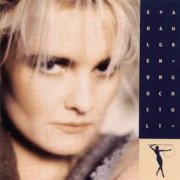 |
Ung Och Stolt (1987, 43.06) **½/T |
|
| Jag Klär av Mig Naken Ung Och Stolt Skeppet Resan Little Darling Älska Mej Lämna Mej Inte Här Fromme Mannen |
Allt för Dej Mitt Liv Hjärtats Ödsliga Slag Friheten |
|
Current availability:
Mellotron used:
Eva Dahlgren is a successful, mainstream Swedish pop/rock artist, active since the late '70s, 1987's Ung Och Stolt being her seventh album. It's a long way from the trashy, 'typical '80s production you might expect, with a torch song/cabaret influence on several tracks, which isn't to say it's either groundbreaking or something I'd particularly recommend, but at least much of it doesn't actually offend.
Anders Glenmark plays Mellotron on Mitt Liv, with upfront choppy string, flute and cello parts on an album released in one of the lowest-Mellotron-use years since the mid-'60s. So; not terrible, one genuinely good Mellotron track.
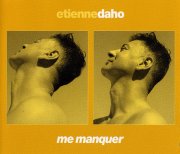 |
CDS (1997, 22.26) **/½ Me Manquer (remixé par Bibi et Étienne Daho - version longue) Me Manquer (version single) De Bien Jolies Flammes (inédit - rough mix alternatif) Me Manquer (remixé par Bibi et Étienne Daho - version courte) Me Manquer (Londres en été - Air remix) |
Current availability:
Mellotron used:
For somebody I've never heard of, Étienne Daho has been around for a surprisingly long time, having been born in the mid-'50s. 1997's five-track Me Manquer single (originally on the previous year's Eden) is a fairly typical chanson-influenced French pop song, entirely unremarkable, unless you understand French and listen to the lyrics. Thinking about it, it's probably unremarkable even then.
The only thing that interests us here is the last track, the Londres En Été - Air remix, where that outfit's Jean-Benoît Dunckel and Nicolas Godin apparently both add a vague flute part that neither enhances nor detracts from the overall impression. Will you bother with this? Unlikely.
See: Air
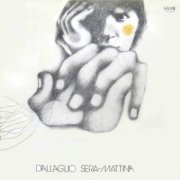 |
Sera - Mattina (1972, 35.07) ***/TT½Ogni Sera CosiDolce Volonta Quando Scendevi le Scale L'Altro Me Stesso Le Mie Illusioni Il Cielo e la Terra La Grande Pianura Padre Nostro Per Amore |
Current availability:
Mellotron used:
Gianni Dall'aglio, later drummer with Il Volo, produced a solo album, Sera - Mattina, in 1972, though it'd be difficult to classify this as particularly progressive, most of it consisting of piano ballads in the Italian tradition. It isn't bad at what it does, but even at only thirty-five minutes, it begins to drag after a few tracks, especially when one is unable to understand the lyrics. The pace does pick up occasionally, notably on closer Per Amore, when the whole band suddenly kick off in the middle of the song, almost sounding like a rock band for a moment.
Gaetano Leandro plays organ, Moog and Mellotron throughout, although Dall'aglio himself plays all the piano and the occasional drum part. Leandro's Mellotron use is pretty upfront, particularly the first time you hear it, with some very high-in-the-mix flutes on opener Ogni Sera Cosi. From there on, it's strings all the way, although the part on L'Altro Me Stesso is quite clearly uncredited string synth. I can't honestly say the Mellotron use is exactly innovative, not that I'm complaining, you understand. Think how much higher the album's potential cheese factor would've been had they used real strings...
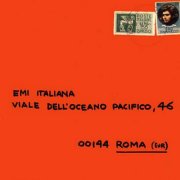 |
Mittente (1973, 36.51) ***/TTTTT |
|
| Tu Mi Eri Scoppiata nel Cuore Dolce Jenny Vorrei Poterti Dir Ti Amo Io So di un Uomo Forse Domani Ritorno da Te Per Amore Ricomincerei Gibilterra Le Rose Blu |
Il Vecchio e il Violino Autunno |
|
Current availability:
Mellotron used:
Isn't it strange how you can list an album as 'unconfirmed Mellotron', only to find out it's absolutely swamped with the thing? Well, it is for me, anyway. Your experience may be different. Ciro Dammicco is a singer-songwriter, whose debut, 1973's Mittente, is one of those Italian albums of the era that hint at progressive rock, while actually being nothing of the sort. Don't get me wrong - this isn't terrible, but nor is it a lost prog classic. At its best on closer Autunno, this also contains Dammicco's Le Rose Blu, later rewritten as Soleado, which, with English lyrics, became Christmas favourite (?) When A Child Is Born. Aaargh.
Dammicco plays Mellotron himself, with background strings on opener Tu Mi Eri Scoppiata Nel Cuore, in full 'orchestral replacement' mode, with more of the same on Dolce Jenny, strings and brass on Vorrei Poterti Dir Ti Amo and Io So di Un Uomo, upfront flutes, brass and strings on Forse Domani Ritorno Da Te, more upfront flutes and strings on Per Amore Ricomincerei and Autunno, upfront strings and background brass on Gibilterra and upfront brass and background strings on Le Rose Blu. However, the violins and flute on Il Vecchio E Il Violino sound real, presumably in honour of its subject matter. See? Told you it was swamped in Mellotron... I can't remember the last time I gave something the full TTTTT. Not the greatest music, then, but complete Mellotron mayhem.
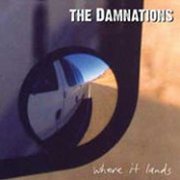 |
Where it Lands (2002, 36.49) ***½/T |
|
| All Night Special Root on Quarter in the Couch Wanna Be Your Mama Steeple Full of Swallows Bloodhound New Hope Cemetery Animal Children |
Corona Tora Tora Tora Time to Go Home |
|
Current availability:
Mellotron used:
After various label hassles, The Damnations have shucked off the 'TX' appendage attached to their name for their debut, 1999's Half Mad Moon and have gone down the independent route for Where it Lands. Probably the best description of their style is the already-wearing-thin appellation 'Americana', i.e. country-ish post-punk rock - a sort of Cash/Clash crossover, maybe, although they don't really sound like either artist. New Hope Cemetery is a good example of the Clash side of their sound, though they mostly tend towards the Cash.
Like many of their peers, the two-female/two-male outfit use quite retro equipment, where appropriate, so various elderly organs and pianos are the order of the day, not to mention one Mellotron track, Animal Children. It's a fairly typically country number, although the chord changes go in a different direction to the expected, which has to be good; guitarist Rob Bernard plays a mournful string part toward the end of the track, though it doesn't exactly fall into the 'essential Mellotron' category, to be honest.
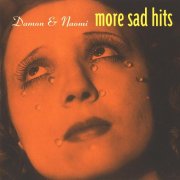 |
More Sad Hits (1992, 43.58) **½/T |
|
| E.T.A. Little Red Record Co. Information Age Laika This Car Climbed Mt. Washington Memories Astrafiammante Boston's Daily Temperature |
(scene change) Sir Thomas and Sir Robert Once More This Changing World |
|
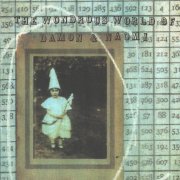 |
The Wondrous World of Damon & Naomi (1995, 41.45) **½/T½ |
|
| In the Morning The New Historicism Tour of the World Forgot to Get High Pyewacket Life Will Pass You By Who am I New York City |
Pandora's Box How Long Whispering Pines |
|
Current availability:
Mellotrons used:
Damon Krukowski and Naomi Yang are the two-thirds of Galaxie 500 who aren't Dean Wareham, later of Luna. After G500's split (Wareham walked out), Krukowski and Yang formed Damon & Naomi, releasing their first album, More Sad Hits, in 1992. It's a strange little album of rather tortured-sounding folk-influenced, downbeat indie, for want of a better description. Looking at the sleeve, I realise I'm not really in on the joke, but '90s indie-scene humour pretty much passes me by, to be honest. Better tracks include This Car Climbed Mt. Washington (for the duelling guitars), Boston's Daily Temperature (for the woodwinds) and Once More (for the drone). They also cover The Soft Machine's Memories, although I'll 'fess up and admit I don't know it. Producer Kramer plays Mellotron, with piping, barely-in-tune flutes and screechy strings on Little Red Record Co.
They followed up with '95's The Wondrous World of Damon & Naomi, one of those albums where a few tracks sound fine, but even forty minutes of it begins to drag after a while, which is a shame, as its basic premise is good, just slightly overplayed. Kramer on Mellotron again, with exceedingly full-on flute and string parts on Pandora's Box and more strings on How Long, although the rumoured Mellotron on opener In The Morning turns out to be a chimera. What, you haven't heard of the Vox Chimera?
See: Kramer
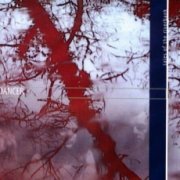 |
Tales of the Riverbank (2001, recorded 1972, 39.08) ***½/TTTales of the RiverbankAmerica Wood Morning Mac's Cafe This Change in Me Fairhill Affair Mind the Houses |
Current availability:
Mellotron used:
Dancer were a little-known progressive band hailing from the Isle of Wight, a rather culturally isolated island off the south coast of England, despite being only a short ferry ride from the mainland. Although they released nothing in their lifetime, luckily, they had the resources to record an album's-worth of material in 1972, finally released by those nice people at Kissing Spell in 2001 as Tales of the Riverbank and, would'ja believe it, it's really very good? Its highlight is undoubtedly the lengthy title track, a full-on prog epic, no less, but while some of the tracks (Mac's Cafe, Mind The Houses) are a bit on the ordinary side, there's nothing here that actually offends.
One (the only?) interesting fact about Dancer is that their keyboard player was a young Anthony Minghella, now, of course, known as director of The English Patient, amongst others. Given that the album was recorded in a London studio and was produced by the Groundhogs' Tony McPhee, the band had access to some pretty good equipment and Minghella got some Mellotron (McPhee's?) on a couple of tracks (McPhee is also rumoured to have played it at the session). Tales Of The Riverbank itself has cellos near the beginning, with a good quantity of strings scattered throughout the piece, plus a brass part on Morning, although that appears to be it, despite Internet witterings to the contrary.
A sad footnote to this review is that Minghella died on the 18th March, 2008, of complications from a cancer operation. After such a stellar career in film, it's hardly surprising that his rump musical career hasn't been mentioned in the obituaries.
See: Groundhogs
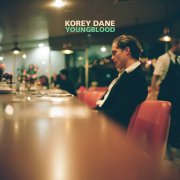 |
Youngblood (2015, 39.07) ***/T½ |
|
| Jules Verne Let it Be Just for Fun I'm Your Man Little Dream Pony & the Kid Louisiana Sundance You'll Be Had Thieves |
Blue Limping Phoenix (Seeds of a Watermelon Heart) Heaven Won't Let Me in The Lion & the Keeper |
|
Current availability:
Mellotron/Chamberlin used:
Californian Korey Dane is, at heart, what Allmusic describe as a 'coffeehouse folkie', a singer-songwriter at his best when stripping it back to acoustic guitar and voice. 2015's Youngblood is his third album, highlights including the muted Let It Be Just For Fun, Pony & The Kid's country and Heaven Won't Let Me In's 12-string powerpop, although full-band numbers such as opener Jules Verne and I'm Your Man tend to detract from the overall effect.
Patrick Warren does his increasingly rare tape-replay thing on both Mellotron and Chamberlin, while Tony Berg also plays Chamby, with Chamberlin woodwinds on Little Dream, volume-pedalled Mellotron strings on Pony & The Kid and upfront strings on Heaven Won't Let Me In. While this didn't blow me away, it's undeniably refreshing to hear a modern artist eschew indie stylings and use genuine tape-replay instruments.
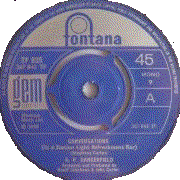 |
7" (1968) ***½/TT½ Conversations (in a Station Light Refreshment Bar part 1) Further Conversations |
Current availability:
Mellotron used:
Very little is known about A.P. Dangerfield, almost certainly a nom-de-plume, probably of the Carter/Lewis production team behind The Flower Pot Men. His/their sole single, 1968's Conversations (In A Station Light Refreshment Bar) was a two-part effort, split over both sides of the disc, the 'A' probably working better, although this is crying out for a professional edit of both halves. It's a typical Kinks/Beatlesesque effort, complete with station announcements; thinking about it, Manfred Mann's kitchen-sink mini-dramas are probably a better comparison. You get the idea, anyway.
The unknown Mellotron player adds some lovely flute and string parts to both sides, making it a pity this isn't more easily available, although it has turned up on a limited-edition box set, We Can Fly. Given that you may not want to splash out on an expensive set that's probably already sold out, there's a download of both sides around somewhere, too. Recommended. Incidentally, major thanks to Julian for putting me onto this and supplying the label scan.
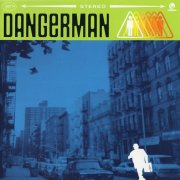 |
Dangerman (1999, 41.02) ***/T |
|
| Let's Make a Deal On the Eastside Roll 'Em Down Good Friend You Never Really Know Remember Luckiest Man It'll Comeback |
High Heeled Sneakers Memphis I Do Not Play No Rock'n'Roll |
|
Current availability:
Mellotron used:
NYC duo Dangerman were a one-off outfit, one of, oh a million or three artists denied promotion by their record company (why do they do that?). 1999's Dangerman freely mixes rock, funk, soul, Latin and hip-hop, amongst other genres, into a stew of what they describe as 'urban rock', possibly typified by Remember, incorporating tribal vocal samples, alt.rock guitars and bagpipes (!). Best tracks? Possibly the rocky You Never Really Know, Remember and the grammatically-challenged It'll Comeback.
Producer Brendan O'Brien plays a high Mellotron string line on On The Eastside, although that would appear to be our lot. Every track here sounds different to every other, which can be seen as both a strength and a weakness; their eclecticism is commendable, but clearly contributed to their lack of commercial success. People, not least record company executives, like to be able to put artists into boxes; I can't imagine what kind of box would hold Dangerman.
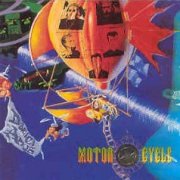 |
MotorCycle (1993, 48.18) ***/TTT |
|
| Banquet at the World's End Traps, Ensnares Hole in the World (What's Come) Over Me Buffalo Hills Guilty Motorcycle Wonderful |
So Long My Frontier Grace is the Smell of Rain Noelle Wise Acres So Long Again |
|
Current availability:
Mellotron used:
I'm surprised to find out that Daniel Amos (there's no such person, of course, also known as D.A. or Dä) have been around since 1974. While nominally CCM, they refuse to fall into the Christian music trap, at least going by 1993's MotorCycle, which is a pleasant enough album of harmless pop/rock. OK, so little here makes me want to leap up and down in sheer joy (OK, none of it), but nor did anything actually offend, which is such a rarity for me in the Christian music industry that it's worth mentioning.
Rob Watson plays Mellotron, in those effectively pre-sample days, slathering it all over the album like there's no tomorrow, to my great surprise. What you get is a skronky flute part opening the album, flutes and strings on Traps, Ensnares, flutes on Buffalo Hills, Motorcycle and Noelle and strings on Grace Is The Smell Of Rain. It's possible there's a little more hiding away somewhere (little of it is high in the mix), but this is certainly the main use. So; an inoffensive Christian album, Hooray! No cheeso lyrics (or none that I noticed), no vile, nursery-rhyme melodies, no horrid ballads... And plenty of Mellotron. Result!
See: Terry Scott Taylor
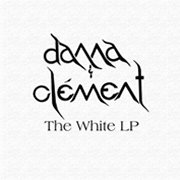 |
The White Album [as Danna & Clément] (1977, 24.55) ***½/TTDarkness at NoonPing-Pong Parade The People Left Behind Watch the Clouds The Seasons Summer Last Words Autumn Winter (Season of the Holocaust) Spring |
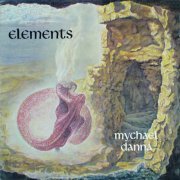 |
Elements (1979, 33.58) ***½/TFireAir Water Earth Ether |
Current availability:
Mellotrons used:
For the last thirty-plus years, Mychael Danna has been known primarily as a composer of film scores, including Being Julia, Monsoon Wedding and Ride With The Devil, but he'd been making music for a good decade before his 1987 film debut (Family Viewing), his first release, The White Album (as Danna & [Tim] Clément), dating from as early as 1977. Originally a single-sided LP, its brief twenty-five minutes lay out Danna's future gameplan, multi-overdubbed synth soundscapes sounding little like other electronic pioneers of the time, having more of a basis in progressive rock, if not the classical scene. Ping-Pong Parade opens with the (real or faked?) sound of a late '70s electronic ping-pong game (one of the earliest home computer games, for those too young to remember), while closer The Seasons takes up half the side, its thoughtful synth/guitar sonorities the diametric opposite of the era's wilder synthesists. Danna plays Mellotron choirs and strings on one of the album's two vocal tracks, The People Left Behind, strings on part three of The Seasons, Winter (Season Of The Holocaust) and flutes on part four, Spring, the other vocal piece, all to good effect.
1979's Elements appears to be his debut solo album proper and, rather unsurprisingly, sounds a little like a soundtrack in places, although it also has the feel of one of those 'classical music played on synths' records, but in a good way. His brother (and future soundtrack collaborator) Jeff and the aforementioned Tim Clément play guitar, not that there's an awful lot to be heard, ditto Larry Potvin's percussion; this is Mychael's record, make no mistake. Opener Fire is particularly orchestral sounding, Air being more of an enhanced piano piece, with side two's pieces being more 'electronic', whatever you take that to mean. Danna uses the Mellotron pretty subtly, with ethereal (Mellotron cliché alert) choirs at the beginning of Fire, sparse strings in Water and almost-unnoticeable flutes in Earth, but that would appear to be your lot, the various synths definitely taking centre-stage across most of the album.
Amazingly, The White Album is available on CD (actually CD-R, which isn't the same thing at all), but Elements is sadly long out of print, although I picked an almost pristine copy up at an exceedingly reasonable 'buy it now' price on eBay, so it's not impossible to find. But do you want to? Well, if synth-heavy instrumental prog is your thing, I think you probably do. Let's just hope some label with more sense than money sees fit to reissue this at some point, assuming Mr. Danna hasn't locked the master tapes away or destroyed them or something. Not a classic, but not at all bad, although not worth it for the Mellotron. Incidentally, Canuck power trio Triumph's second album, '77's Rock & Roll Machine, features a certain 'Mike' Danna on extra keyboards, including the Mellotron on one track.
See: Triumph
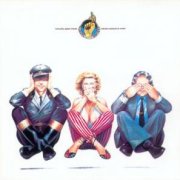 |
Traurig Aber Wahr (1980, 43.30) ***/½Vogelfrei/Der SchreiDeppert's Kind Ich Will Nicht Mehr Traurig, Aber Wahr Der Alte Wessely (Gewidmet 140.000 Österreichern) Ich Steig Aus Zerschlagt die Computer/Diese Riesige Maschine Zu Spät |
Current availability:
Mellotron used:
Georg Danzer (1946-2007) was one of Austria's better-known singer-songwriters, producing over forty studio and live albums in a thirty five-year career. Unsurprisingly, 1980's Traurig Aber Wahr is pretty much of its time, as is so often the case with artists whose chief raison d'être is to communicate their thoughts via song, musical style often being pushed down the priority list. The album flits between piano ballads (Deppert's Kind, Der Alte Wessely), vaguely new-wavish material (Ich Will Nicht Mehr, Ich Steig Aus) and several tracks with a vaguely progressive feel to them. Strangely, the album has not just a Pink Floyd influence, but a very specific Wish You Were Here one: opener Vogelfrei is a low-budget Shine On You Crazy Diamond, the title track kicks off in Wish You Were Here itself mode, Zerschlagt Die Computer has a faint Welcome To The Machine feel, while Diese Riesige Maschine has a more general Gilmour thing going on. Weird.
Eberhard "Bär" Wieland supposedly plays Mellotron, although the only even vaguely possible part is the distant choirs on Vogelfrei, the male voices on Der Alte Wessely appearing to be real. I'm not sure whom, other than Danzer fans, might go for this odd album; its progressiveness is too diffuse to appeal to any but the most desperate prog fan, while new wave fans will probably dislike its Floydisms. Not actually a bad record, in its own way, but not one for Mellotron fans, either.